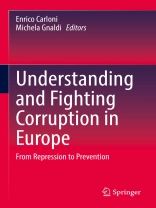The volume includes comparative and comprehensive discussions on anti-corruption policies of governments and anti-corruption agencies across Europe. Compared to existing literature that focuses either on general and theoretical aspects related to corruption or on country-specific experiences, this volume provides an interdisciplinary and broad overview of corruption prevention policies and measures undertaken by major European member states, relying both on literature and on institutional documentation of national anti-corruption agencies, which greatly contribute to shaping anti-corruption policy directions. In so doing, it advances the existing theoretical agenda of corruption studies and policies, situating it within wider disciplinary fields. This volume is especially concerned with the interrelationship between good administration, integrity, ethical behaviour and corruption; the role of transparency and digitalisation in preventing corruption and ensuring rights, efficiency and impartiality in the public administration; the measurement of corruption, with specific reference to preventative measures and indicators of administrative anti-corruption efforts; big data, block chains, and artificial intelligence; public management codes of ethics, performance targets and skills, and their role in tackling and preventing corruption; and public procurement, transparency and anti-bribery measures in the European public procurement system. This volume is of interest to graduate students and researchers in political sociology, political science, European corruption law, international relations, public policy, and social statistics.
قائمة المحتويات
Preventing corruption in Europe: an interdisciplinary perspective.- Limits of corruption repression and new prevention policies.- Corruption, mass media and public opinion.- Measuring corruption.- Good administration, integrity and corruption.- Transparency, digitalization and corruption.- Public procurement and corruption: perspectives, rules, experiences.
عن المؤلف
Enrico Carloni (Ph.D., Bononia University, 2001) is Full Professor of Administrative Law at the Department of Political Sciences of the University of Perugia, Italy, where he teaches anti-corruption and transparency policies. He is coordinator of the undergraduate and master’s degrees in political science, Director of the Study Center for Legality and Participation (LEPA) of University of Perugia, and is principal investigator of a European research project on administrative contrast to corruption (Hercules program, since 2019). He is the editor of Fighting corruption through administrative measures (Perugia, 2019) and co-author of Corruption and anti-corruption. Ten lessons (Milan, 2018, with R. Cantone). He was expert of the Council of the Italian National Anti-Corruption Authority and he has carried out consultancy and support for the development of anti-corruption policies in various international cooperation projects.
Michela Gnaldi is Associate Professor of Applied Statistics at the Faculty of Political Sciences, University of Perugia, Italy, where she teaches Data science for the quality of institutions and Quantitative methods in social research. She is consultant of the Council of the Italian National Anti-Corruption Authority, as a senior statistician, and of other national and international agencies (e.g., UNHCR and World Bank). She is the Principal Investigator of the project CO.R.E. – COrruption Risk indicators in Emergency – funded by the EU Commission under the call ISFP 2020 AG CORRUPT. She has been the co-leader of the Italian project “Measuring and contrasting corruption. Direct and indirect methods to quantify corruption”. She is official representative of the University of Perugia within the ECPR, European Consortium for Political Research, and its standing group “Anti-Corruption and Integrity”. She is co-editor, author and co-author of books and scientific articles on methodological issues in composite indicators construction, corruption measurement and indicators, and evaluation of the impact of public policies.












